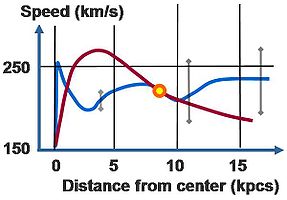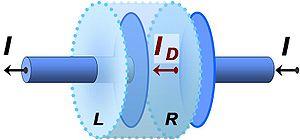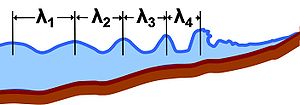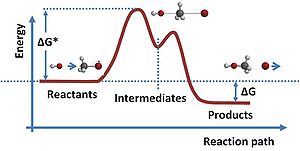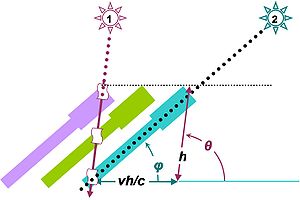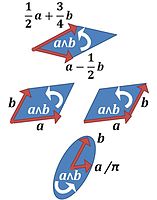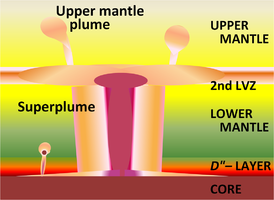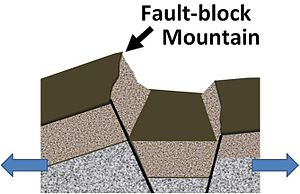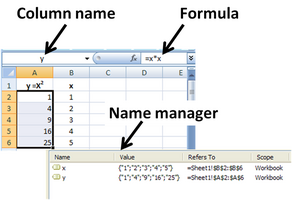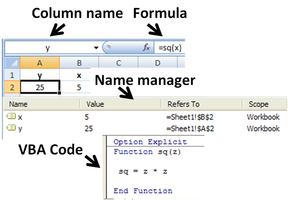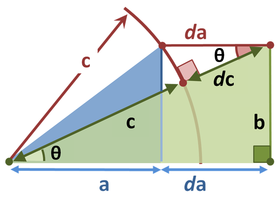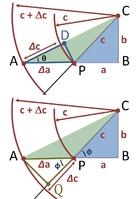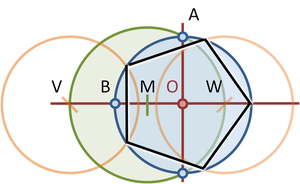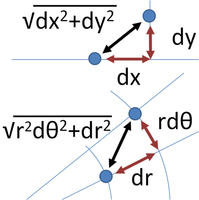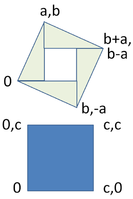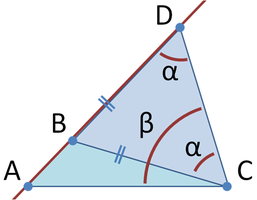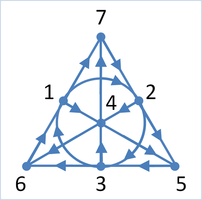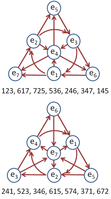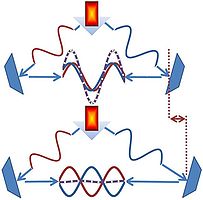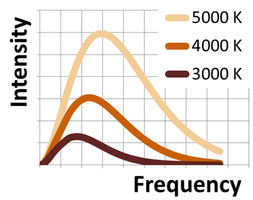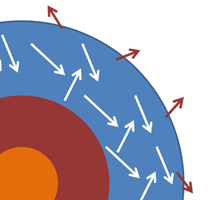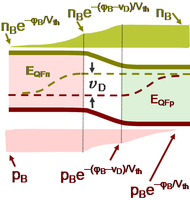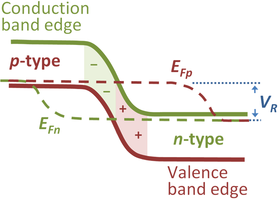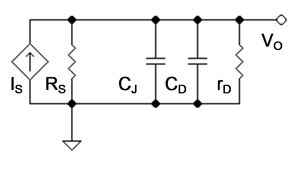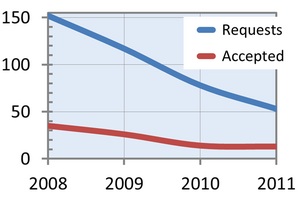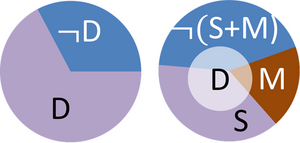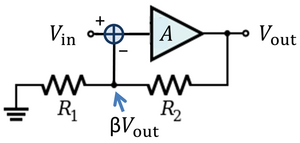User:Brews ohare
Suggestions
[edit]A few essays resulting from experience on WP:
Consideration of these essays could greatly improve the editing environment and help WP to overcome the rancor associated with the present dysfunctional ArbCom actions. Such improvements will result when the Sun rises in the West. Unfortunately, one must ask just what is the objective of the project for various editors?
The relation of community to content is complicated, and not all those engaged in Wikipedia are interested in it as an encyclopedia. In my opinion, this relation is tenuous for many and, for them, community is defined without connection to an encyclopedia. These Wikipedians are souls unconsciously looking for group therapy in an environment without expertise in such matters. Limiting the environment of WP to knowledge creation, the heart of an encyclopedia, interferes with the untrammeled interpersonal exchanges that are the purpose of the project for these individuals.
The dominance of this orientation means no formal, systematic mechanism is entertained for improvements in the organization for building an encyclopedia. A better system isn't dreamt of! Fair Process is an alien concept. Without vision, well:
- You got to have a dream, if you don't have a dream
- How you gonna have a dream come true?
I have posted an outline of the WP administrative structure, and an outline of the WP editing environment and how dispute is handled when it arises. These articles summarizing Wikipedia's own documentation are eye-opening, and may be helpful in working with this organization.
On February 17, 2012 the article "The 'Undue Weight' of Truth on Wikipedia" detailed the efforts of Timothy Messer-Kruse to correct the treatment on WP of the 1886 trials related to the Haymarket riot. Messer-Kruse ran into objections based on "verifiability vs. truth" , "majority vs. minority views", "primary vs. secondary sources", and "original research", all of which proved to be handy tools to obstruct an authoritative account on WP. Timothy was wise enough to desist before being brought before ArbCom, but we are the poorer for that, having missed the opportunity for an entertaining description of what occurs there.
On September 7, 2012 Philip Roth challenged the statement from WP that of one of his books The Human Stain was based upon a particular real-life occurrence. Roth was told he was not a credible source. Wikipedia informed Roth: “I understand your point that the author is the greatest authority on their own work,” writes the Wikipedia Administrator—“but we require secondary sources.” See Philip Roth (September 7, 2012). "An open letter to Wikipedia". The New Yorker.. Some of the nonsensical exchange between editors is found here.
Roth's and Messer-Kruse's experiences are known to be common, and some readers are so alarmed by such adventures as to choose not to attempt corrections. On January 19, 2014, Francine Prose, concerning an error in her Wikipedia entry (unfortunately often repeated by readers of this entry), lamented in the New York Times Sunday book review section "Bookends" that she could not bring herself to engage in the "byzantine process apparently required to correct this mistake". She went on to discuss the role of Wikipedia and it's lamentable absence of the "saintly, underappreciated, endangered species that has so often saved me from public humiliation: fact checkers". She concludes "Could someone (not me) please correct that Wikipedia entry?".
User:Brews ohare/Quoted citations User:Brews ohare/CITEinQUOTE User:Brews ohare/WP:Citations inside quotations
Images
[edit]
|
The Graphic Designer's Barnstar | |
| Keep up the good work! Paradoctor (talk) 20:26, 6 May 2009 (UTC) |
- Some of my figures contributed so far
-
Circuit 1 with current I1 exerts force F12 on Circuit 2 via its B-field B1, and conversely.
-
Figure 3: Step-response of a linear two-pole feedback amplifier; time is in units of 1/ρ, that is, in terms of the time constants of AOL; curves are plotted for three values of mu = μ, which is controlled by β.
-
Figure 2: Conjugate pole locations for step response of two-pole feedback amplifier; Re(s) = real axis and Im(s) = imaginary axis.
-
Figure 1: Ideal negative feedback model; open loop gain is AOL and feedback factor is β.
-
Figure 4: Miller capacitance at low frequencies CM (top) and compensation capacitor CC (bottom) as a function of gain using Excel. Capacitance units are pF.
-
Figure 2: Gain vs. frequency for a single-pole amplifier with and without feedback; corner frequencies are labeled.
-
Figure 6: Circuit set-up for finding feedback amplifier input resistance
-
Figure 5: Small-signal circuit with two-port for feedback network; upper shaded box: main amplifier; lower shaded box: feedback two-port replacing the L-section made up of Rf and R2.
-
As channel length decreases, the barrier φB to be surmounted by an electron from the source on its way to the drain reduces
-
Figure 6: Gain of feedback amplifier AFB in dB and corresponding open-loop amplifier AOL. Parameter 1/β = 58 dB, and at low frequencies AFB ≈ 58 dB as well. The gain margin in this amplifier is nearly zero because | βAOL| = 1 occurs at almost f = f180°.
-
MOSFET showing shallow junction extensions, raised source and drain and halo implant. Raised source and drain separated from gate by oxide spacers.
-
Bands in graded heterojunction npn bipolar transistor. Barriers indicated for electrons to move from emitter to base, and for holes to be injected backward from base to emitter; Also, grading of bandgap in base assists electron transport in base region; Light colors indicate depleted regions.
-
Figure 1: Operational amplifier with compensation capacitor CC between input and output; notice the amplifier has both input impedance Ri and output impedance Ro.
-
Figure 2: Operational amplifier with compensation capacitor transformed using Miller's theorem to replace the compensation capacitor with a Miller capacitor at the input and a frequency-dependent dependent current source at the output.
-
MOSFET version of gain-boosted current mirror; M1 and M2 are in active mode, while M3 and M4 are in Ohmic mode, and act like resistors. The operational amplifier provides feedback that maintains a high output resistance
-
Figure 1. Top: pnp base width for low collector–base reverse bias; Bottom: narrower pnp base width for large collector–base reverse bias. Light colors are depleted regions.
-
Figure 4: Bode magnitude plot for pole-zero combination; the location of the zero is ten times higher than in Figures 2&3; curves labeled "Bode" are the straight-line Bode plots
-
Figure 5: Bode phase plot for pole-zero combination; the location of the zero is ten times higher than in Figures 2&3; curves labeled "Bode" are the straight-line Bode plots
-
Figure 8: Gain of feedback amplifier AFB in dB and corresponding open-loop amplifier AOL. In this example, 1 / β = 77 dB. The gain margin in this amplifier is 19 dB.
-
Figure 9: Phase of feedback amplifier AFB in degrees and corresponding open-loop amplifier AOL. The phase margin in this amplifier is 45°.
-
Figure 2: A vector field F ( r, t ) defined throughout space, and a surface Σ bounded by curve ∂Σ moving with velocity v over which the field is integrated.
-
Figure 4: An example, based on one of Feynman's examples, where Faraday's law does not work. A rectangle of photoconductive material slides along a pair of wires. At a fixed location a strong light and a strong magnetic field create a narrow immovable strip of conducting material subject to a Lorentz force.
-
Figure 4: Faraday's disc electric generator. The disc rotates with angular rate ω, sweeping the conducting radius circularly in the static magnetic field B. The magnetic Lorentz force v × B drives the current along the conducting radius to the conducting rim, and from there the circuit completes through the lower brush and the axle supporting the disc. Thus, current is generated from mechanical motion.
-
Figure 3: Mapping of the Faraday disc into a sliding conducting rectangle example. The disc is viewed as an annulus; it is cut along a radius and bent open to become a rectangle.
-
Figure 2: Rectangular wire loop in magnetic field B moving along x-axis at velocity v.
-
Figure 3: A ball moving vertically along the axis of rotation in an inertial frame appears to spiral downward in the rotating frame. The right panel shows a downward view in the rotating frame.
-
Figure 6: A parachutist moving vertically parallel to the axis of rotation in a rotating frame appears to spiral downward in the inertial frame. The parachutist begins the drop with a horizontal component of velocity the same as the target site. The left panel shows a downward view in the inertial frame. The rate of rotation |Ω| = ω is assumed constant in time.
-
Car with passenger making a turn. The road exerts a centripetal force on the car to force a curved path.
-
Figure 3: Exploded view showing force components. Each object is subject to a net inward force that is the difference between the outward reactive centrifugal force and an inward centripetal force. This net inward force is the centripetal force upon that object necessary for it to make the turn. (Torque is ignored here, for simplicity.)
-
Coordinate system at latitude φ with x-axis east, y-axis north and z-axis upward (that is, radially outward from center of sphere).
-
Figure 2: Small-signal circuit for finding output resistance of the Widlar source shown in Figure 1. A test current Ix is applied at the output, and the output resistance is then RO = Vx / Ix.
-
Integration over the triangular area can be done using vertical or horizontal strips as the first step. The sloped line is the curve y = x.
-
Figure 1: An object located at xA in inertial frame A is located at location xB in accelerating frame B. The origin of frame B is located at XAB in frame A. The orientation of frame B is determined by the unit vectors along its coordinate directions, uj with j = 1, 2, 3. Using these axes, the coordinates of the object according to frame B are xB = ( x1, x2, x3 ).
-
Figure 4: Left panel: Ball on a banked circular track moving with constant speed v; Right panel: Forces on the ball. The resultant or net force on the ball found by vector addition of the normal force exerted by the road and vertical force due to gravity must equal the centripetal force dictated by the need to travel a circular path.
-
Some details of the Earth-Moon system. Besides the radius of each object, the radius to the Earth-Moon barycenter is shown. Photos from [NASA]. Data from [NASA]. Planets aren't spheres and orbits aren't circles, so numbers are only indicative. The Moon's orbital plane precesses about the Earth in an 18.6 year cycle. Its axis is located by Cassini's third law.
-
Figure 5: Simplified sketch of centrifugal clutch. The spring provides centripetal force to the shoe, and the shoe exerts a reactive centrifugal force upon the spring.
-
Geometric construction for Kepler's calculation of θ. The sun (located at the focus) is labeled S and the planet P. The auxiliary circle is an aid to calculation. Line xd is perpendicular to the base and through the planet P. The shaded sectors are arranged to have equal areas by positioning of point y.
-
Heliocentric coordinate system (r, θ) for ellipse. Also shown are: semi-major axis a, semi-minor axis b and semi-latus rectum p; center of ellipse and its two foci marked by large dots. For θ = 0°, r = rmin and for θ = 180°, r = rmax.
-
Figure 2: Force diagram for an element of water surface in co-rotating frame. Top: Radial section and selected point on water surface. Bottom: Force diagram at selected point on surface.
-
Figure 1: Top panel: accelerating car of mass M with passenger of mass m. The force from the axle is (m + M)a. Center panel: an exploded view in the inertial frame. Bottom panel: an exploded view in the non-inertial frame.
-
Constant energy ellipsoids in silicon near the six conduction band minima.
-
A capacitor with charges represented by blue and red circles. Left: unpolarized dipole. Right: polarized dipole. Box is a Gaussian surface Σ.
-
Ball toss on rotating carousel. Left: co-rotating frame; Right: stationary frame. Time intervals are 1/10 of time from launch to bounce.
-
A model of a neutron star's internal structure.
-
Galaxy rotation curve for the Milky Way. Blue curve: observed; Red curve: predicted; difference due to dark matter.
-
An electrically charging capacitor with an imaginary cylindrical surface surrounding the left-hand plate. Current continuity requires the net current entering the imaginary cylindrical surface to be zero. Therefore, a displacement current ID is required to flow across surface R.
-
Schematic of the Foucault apparatus. Left panel: Light is reflected by a rotating mirror (left) toward a stationary mirror (top right). Right panel: The reflected light from the stationary mirror bounces from the rotating mirror that has advanced an angle θ during the transit of the light.
-
A schematic representation of a Michelson interferometer, as used for the Michelson-Morley experiment. The point of reflection on the tilted beam splitter is shown as two separated points for clarity.
-
A variety of possible recession velocity vs. redshift functions including the simple linear relation v = cz; a variety of possible shapes from theories of cosmological expansion related to general relativity; and a curve that does not permit speeds faster than light in accordance with special relativity. All curves are linear at low redshifts.
-
Phase diagram for a typical substance at a fixed volume. Vertical axis is Pressure, horizontal axis is Temperature. The green line marks the freezing point (above the green line is solid, below it is liquid) and the blue line the boiling point (above it is liquid and below it is gas)
-
Phases of nuclear matter; Compare with Siemens & Jensen.
-
Pie chart showing the fractions of energy in the universe contributed by different sources. Ordinary matter is divided into luminous matter (the stars and luminous gases and 0.005% radiation) and nonluminous matter (intergalactic gas and about 0.1% neutrinos and 0.04% supermassive black holes). Ordinary matter is uncommon. Modeled after Ostriker and Steinhardt.
-
Sinusoidal standing waves in a box that constrains the end points to be nodes will have an integer number of half wavelengths fitting in the box.
-
Wavelength is decreased in a medium with higher refractive index.
-
A wave on a line of atoms can be interpreted according to a variety of wavelengths.
-
Various local wavelengths on a crest-to-crest basis in an ocean wave approaching shore.
-
Local and periodic wavelengths
-
Pattern of light intensity on a screen for light passing through two slits. The pattern is idealized: an observed intensity pattern is modified by diffraction.
-
Wavelength of an irregular periodic waveform at a particular moment in time. The same λ separates any two similarly situated points in the waveform.
-
A typical reaction path requires the initial reactants to cross an energy barrier, enter an intermediate state and finally emerge in a lower energy configuration. If charge separation is involved, this energy difference can result in an emf. See Bergmann et al.
-
Solar cell voltage as a function of solar cell current delivered to a load for two light-induced currents IL; currents as a ratio with reverse saturation current I0. Compare with Fig. 1.4 in Nelson.
-
Superposition of sinusoidal wave basis functions (bottom) to form a sawtooth wave (top); the basis functions have wavelengths λ/n (n=integer) shorter than the wavelength λ of the sawtooth itself (except for n=1). All basis functions have nodes at the nodes of the sawtooth, but all but the fundamental have additional nodes. The oscillation about the sawtooth is called the Gibbs phenomenon.
-
Two different sources of redshift: Top, Doppler shift: the star moving to the left emits light that is blue shifted in the direction of the receiving antenna that the star approaches, and red shifted in the direction of the receiving antenna that the star is leaving. Center and bottom panels: cosmological expansion: The distance between the emitting star and both antennas increases while the light is propagating, increasing the wavelength of the light seen by both antennas.
-
Bradley's data on the north-south component of the aberration of γ-Draconis in 1727 establishing stellar aberration.
-
As light propagates down the telescope, the telescope moves requiring a tilt to the telescope that depends on the speed of light. The apparent angle of the star φ differs from its true angle θ
-
Acceleration is the rate of change of velocity. At any point on a trajectory, the magnitude of the acceleration is given by the rate of change of velocity in both magnitude and direction at that point. The true acceleration at time t is found in the limit as time interval Δt → 0.
-
Components of acceleration for a planar curved motion. The tangential component at is due to the change in speed of traversal, and points along the curve in the direction of the velocity vector. The centripetal component ac is due to the change in direction of the velocity vector and is normal to the trajectory, pointing toward the center of curvature of the path.
-
Various identically oriented and equal area plane segments corresponding to the same bivector ab
-
Earth cross-section showing location of upper and lower mantle
-
An oceanic plate of the lithosphere is added to by upwelling asthenosphere at a spreading ridge (left) and consumed at a subduction zone (right), causing stratovolcanoes at the convergent boundary with the continental plate.
-
A superplume generated by cooling processes in the mantle.
-
Two paths of a P-wave, one direct and one refracted as it crosses the Moho.
-
Fold terminology. For more general fold shapes, a hinge curve replaces the hinge line, and a non-planar axial surface replaces the axial plane.
-
Cylindrical fold with axial surface not a plane.
-
Flow folding: this picture uses artistic license to show the effect of an advancing ramp of rigid rock into compliant layers. Top: low drag by ramp: layers are not altered in thickness; Bottom: high drag: lowest layers tend to crumple.
-
Ramsay classification of folds by convergence of dip isogons (red lines).
-
Two processes that can contribute to an orogen. Top:delamination by intrusion of hot asthenosphere; Bottom: Subduction of ocean crust.
-
Stratovolcanoes associated with a subduction (left) and a spreading ridge volcano (right). A hotspot volcano is center.
-
Fault-block mountain of tilted type.
-
Strike line and dip of a plane describing attitude relative to a horizontal plane and a vertical plane perpendicular to the strike line.
-
Calculated Earth's temperature vs. depth. Dashed curve: Layered mantle convection; Solid curve: Full mantle convection.
-
Velocity of seismic waves in the Earth versus depth. The seismic velocities very near the surface (≤ 220±30 km) are markedly lower than at greater depths, demarking the LVZ.
-
Velocity of seismic S-waves in the Earth near the surface in three tectonic provinces: TNA= Tectonic North America SNA= Shield North America & ATL = North Atlantic.
-
Use of named column variables x & y in Microsoft Excel; y = x*x is calculated using the formula displayed in the formula box, which is copied down the entire y-column.
-
Use of a user-defined function sq(x) of named variable x in Microsoft Excel. Function supplied automatically from the code in the Visual Basic for Applications editor.
-
Subroutine in Excel calculates the square of each member of named column variable x, and writes this value into the corresponding named column variable y.
-
Graph made using Microsoft Excel.
-
Excel maintains 15 figures in its numbers, but they are not always accurate: the bottom line should be the same as the top line.
-
Of course, 1 + x − 1 = x. If a number rounds to a bit, however, the entire 15-digit decimal equivalent of the bit is retained.
-
Generalization of Pythagoras' theorem for scalene triangles, green area = blue area.
-
Diagram for Garfield's proof of Pythagoras' theorem.
-
The volume of a parallelepiped using dot and cross-products; dashed lines show the projections of c onto a × b and of a onto b × c, a first step in finding dot-products.
-
Proof of Pythagoras' theorem using differential equations.
-
Proof using similar triangles.
-
Staring's differential proof of Pythagoras' theorem.
-
A regular pentagon inscribed in a circle of radius a.
-
Pythagoras' theorem in three dimensions relates the diagonal AD to the three sides.
-
Method using Carlyle circles.
-
Distance between infinitesimally separated points in Cartesian and polar coordinates.
-
Orientation of a square of side c described by inserted right triangles of sides a and b.
-
Triangle abc is the orthic triangle of triangle ABC.
-
The eccentric anomaly of point P is the angle E. The center of the ellipse is point C, and the focus is point F. The radial position vector r is taken from the focus F, not from the center of coordinates C.
-
Generalization of Pythagoras' theorem by Tâbit ibn Qorra.
-
Excel graph of the difference between direct evaluation of the roots of a quadratic and an approximation for widely spaced roots. The difference reaches a minimum where round-off takes over, causing squiggles in the curves.
-
Euclid's construction for proof of the triangle inequality.
-
Two frames of reference moving with relative velocity . Frame S' has an arbitrary but fixed rotation with respect to frame S.
-
The Fano plane expressing the products of the unit octonions.
-
Fano planes expressing the 7-D cross-product
-
An interferometric determination of length. Top: constructive interference; bottom: destructive interference.
-
A rotating shaft unbalanced by two attached weights causing a counterclockwise centrifugal couple Cd that must be resisted by a clockwise couple Fℓ exerted by the bearings .
-
Each similar triangle has an area proportional to the square of its own hypotenuse
-
Measuring a length in wavelengths of light using an interferometer.
-
Forces on a ball in circular motion as seen in the inertial frame where the ball is seen to rotate (center) and as seen in a co-rotating frame where the ball appears stationary (right).
-
Free body diagram showing the forces on a ball and a string keeping it in circular motion. Left: inertial frame where the ball is seen to rotate. Right: co-rotating frame where the ball appears stationary.
-
A ball in circular motion held by a string tied to a fixed post.
-
A Feynman diagram (box diagram) for photon-photon scattering, one photon scatters from the transient vacuum charge fluctuations of the other.
-
An approximate realization of a black body as a tiny hole in an insulated enclosure. The figure is a cross-section containing the hole.
-
Black-body radiation is distributed in wavelength in a manner set by the temperature T.
-
Black-body radiation is distributed in energy (or frequency) in a manner set by the temperature T.
-
An idealized view of the cross-section of a star. The photosphere contains photons of light nearly in thermal equilibrium, and some escape into space as near-black-body radiation.
-
Effective temperature of a black body compared with the B-V and U-B color index of main sequence and super giant stars in what is called a color-color diagram.
-
MOSFET showing gate (G), body (B), source (S) and drain (D) terminals. The gate is separated from the body by an insulating layer (white)
-
Channel formation in nMOS MOSFET
-
Vsb splits Fermi levels Fn for electrons and Fp for holes, requiring larger Vgb to populate the conduction band in an nMOS MOSFET
-
Mesa diode structure (top) and planar diode structure with guard-ring (bottom).
-
Band-bending diagram for p–n diode at zero applied voltage. The depletion region is shaded.
-
Band-bending diagram for p–n diode in forward bias. Diffusion drives carriers across the junction.
-
Quasi-Fermi levels and carrier densities in forward biased p–n- diode. The figure assumes recombination is confined to the regions where majority carrier concentration is near the bulk values, which is not accurate when recombination-generation centers in the field region play a role.
-
Band-bending for p–n diode in reverse bias
-
Quasi-Fermi levels in reverse-biased p–n diode.
-
Small-signal circuit for p–n diode driven by a current signal represented as a Norton source.
-
A FinFET MOSFET
-
A modulated waveform in space at a selected time instant composed of two sinusoids of nearly the same wavelength.
-
Diffraction pattern of a double slit has a single-slit envelope.
-
Dispersion relation ω=ω(k) for the valence and conduction bands of GaAs
-
Dispersion relation ω=ω(k) for some waves corresponding to lattice vibrations in GaAs.
-
Electron probabilities in lowest two quantum states of a 160Ǻ GaAs quantum well.
-
Dispersion curves in linear diatomic chain
-
Optical and acoustic vibrations in linear diatomic chain.
-
Signal transmission using electronic signals
-
Requests for formal arbitration cases on English WP
-
New articles/day on English WP
-
New editors/day on English WP
-
Applications and acceptances for Administrator privileges on English WP
-
Average number of blocks/day each month in 2012. Data from English Wikipedia.
-
Some areas of the human brain implicated in mental disorders that might be related to free will. Area 25 refers to Brodmann's area 25, related to long-term depression.
-
Approximate location of the fictional Ponderosa Ranch, the home of Cartwright family. The map is oriented with North at the top, instead of East as in the version associated with the TV show Bonanza
-
Four different views of ontology modeled after Schaffer. Top to bottom: 'flat, sorted, structured and multiply structured
-
Flow chart showing relation between a conceptualization and its various ontologies in information science.
-
Some possible universes
-
An enactive human-machine interface for using and modifying a data base
-
Resource allocation between three competing species
-
Maintaining car speed using negative feedback
-
Maintaining a set point using negative feedback
-
Error-controlled regulation R of system T to maintain essential variables E in the face of disturbances D
-
Feedback for a process using its outputs (top) or the process status (bottom)
-
A negative feedback amplifier with gain 1/β when the open-loop gain A is large
-
A regulator R adjusts the input to a system T so the monitored essential variables E are held to set-point values S that result in the desired system output despite disturbances D
-
A feedback voltage amplifier using an op amp with finite gain but infinite input impedances
-
Negative feedback amplifier with external disturbance
-
Various topologies for a negative feedback amplifier using two-ports.
-
Signal flow graph for feedback amplifier.
-
Example of signal-flow graph.
-
Flow graph for three simultaneous equations.
Something about me
[edit]
Some figures I've contributed to WP are in the gallery above.
I am a Professor Emeritus of Electrical Engineering from The University of Arizona, where I taught device physics and circuit design for just under two decades. Previously, I was a research scientist for twenty-odd years at Bell Laboratories, Murray Hill, doing theoretical work in the areas of solid-state physics and device physics. I also am a Fellow of the IEEE, and a recipient of the Electron Device Society distinguished service award for work as Editor-in-chief of the journal IEEE Electron Device Letters, founded by Nobel prize winner George E. Smith. I've published a number of technical books and papers, some of which may be found at this link.
Something about Wikipedia
[edit]- See also: Criticism of Wikipedia, WP is failing, Expert retention, Thoughts on WP Corruption of Wikipedia
Wikipedia is amazingly successful in producing a variety of articles that, while not authoritative, often contain a lot of interesting information the reader can use to expand their knowledge of a subject. It can be fun to contribute to WP, fun to learn from others, and fun to put together an entertaining and useful article. It also can be very exasperating if the editors contributing to an article you want to work on are not interested in these pursuits, but think of WP as on-line scrimmage, or as a mirror for preening, or as an encyclopedia intended to fit their personal criteria.
One might think that unproductive behavior on WP would be held in check by the Arbitration Committee, but so far this committee has a zero success rate in remedying systemic issues, or even in identifying them. In fact, they spend next to zero time considering critical matters. They are, however, very diligent in applying bans and blocks upon individual editors to cut down clamor, whatever its underlying cause or implications.
Such actions frequently resemble killing the messenger, that is, turning off safety alarms because they are annoying, or Three-Mile Island syndrome, that is, hearing the alarm but having no idea what to do about it.

So a participant on WP must be prepared to live with this environment. You will have periods of fun, learning, success, and satisfaction, counter-weighted by other periods of distress and dismay and, more unfortunately, nausea. These last will be reduced if you simply refuse to participate in arbitration ‘hearings’, beyond a stating an initial position. These actions are about shutting down noise, so the less noise you make, the better. They also are tar babies, and residual attacks and arbitration follow you 'round like gnats in the Quebec woods. Even expired sanctions can be revisited years later as a backdoor means to haul Administrators into a situation that otherwise could never be brought forward.
Here is my succinct summary of the situation:
Involving ArbCom is like asking a three-year old hurrying to the bathroom to discuss Aristotle. Illumination is much less likely than getting pissed on.
Another analogy to ArbCom at work:
You visit the doctor because you cut your left hand: the doctor amputates your right arm and voilà you can't cut yourself again. By the way, the cut causing the visit isn't examined, nevermind treated!
So, smile. If you can't tolerate WP's blind and abusive administration, depart. If you stay, you must work within a severely compromised and dictatorial system that is for sure a rule of men, not laws, where salus populi is not a concept.
“it is increasingly difficult to enjoy contributing to Wikipedia unless you are part of the site's inner core of editors.”
“"In general, the biggest problem I have with the editors [that is, administrators] is their attitude," he says. "They say: 'We're not going to explain how we make decisions, we basically talk amongst ourselves.'”
In sum, unless one ingratiates oneself with the command, you're in for it. This situation is not improving, nor does it appear to be reversible.
Experience on WP
[edit]Some of the illustrations I've added are above. They show my interests are in circuits, devices, and physics. I've also originated several articles that remain in their initial state so far: Envelope (waves), Length measurement, p-n junction, Field effect (semiconductor), Pole splitting, Return ratio, Signal-flow graph, Nullor, Ampere's force law, Bivector; and completely rewritten Step response, Current mirror, Active load, Free space, Widlar current source, Space archaeology and Value judgment and Idée fixe (psychology). The Wikipedia editing and posting environment is really nice to work with. Finding out how things work is not so easy, and editors help here a lot. I've had some run-ins with editors, some constructive and civilized, and I am most happy to acknowledge the editing assistance of User:Rogerbrent. I'm also happy to report a happy collaboration with User:Sbyrnes321 on the article Faraday's law of induction, which proved to be a rather unique example of cooperative evolution.
This romantic epoch ended in late October 2009 with my banning from WP at the behest of a number of disgruntled editors aided by an ArbCom proceeding I thought was misguided, ill-informed, and arbitrary. I stepped into a hornets' nest and the ArbCom beekeepers figured my foot was the problem, not the hornets. Amputation followed. Attempts to discuss guidelines for avoidance of such brouhaha's in future led to broader restrictions, indicating further the limited benevolence and acuity of WP administrators. Initially I thought this proceeding was a shockingly inept exception, but in fact it was entirely ordinary, apart from the unimpeded violations of WP:Civil, a bit unusual, and the acceptance of unvarnished slander, which usually takes the milder form of acceptance of say-so with cavalier disregard for evidence.
Observations
[edit]The mode of administration of WP is identified as at variance with all lessons learned in the history of governance.
A major goal of ArbCom has become respect for ArbCom, regardless. They follow Kant:
- “nothing can have a value other than that determined for it by the law. The law-making, which determines all value, must for this reason have a dignity, that is, unconditional and incomparable worth.”[1]

but turn this idea upside down, to request respect for the lawmakers, rather than for the law making. From the administration viewpoint, command requires respect, not the commands.
Clamor usually is silenced expediently, which means shut down of the minority regardless of majority misbehavior, and regardless of WP policies and guidelines. That way impacts the fewest editors and garners easy support. Here is my succinct summary:
If gunshots are too noisy, it's not the hunters, it's the ducks. No ducks, no noise.

As a rule, sanctions and remedies are proposed that are deliberately vague. Ostensibly, that is done to allow adjustment of remedies so the punishment will fit the crime. In practice though, it takes the Humpty Dumpty form:
“When I use a word,” Humpty Dumpty said, in a rather a scornful tone, “it means just what I choose it to mean—neither more nor less.”
“The question is,” said Alice, “whether you can make words mean so many different things.”
“The question is,” said Humpty Dumpty, “which is to be master that’s all.”
In short, the actual wording of a remedy or sanction is not only meaningless, but deceptive. (I am taking Humpty Dumpty out of context: he was a mathematician, and of course he could define his words as he wished inside of his axiomatic constructions. But that is not the WP environment.)

The real meaning of a remedy is that you are on notice that any action you undertake can be brought before ArbCom, regardless of its nature, and claimed to be a violation. (In fact, one's mere presence in a hearing might be viewed as a disruption because you are "taking up the administrators' time", or as the police chief says in Casablanca, you're one of the "usual suspects"!) You yourself cannot predict on any basis whether any particular sanction will be deemed to have been violated, nor what reprisals will be enacted.
In fact, when a case is brought to ArbCom, or an appeal is made, one should be aware that ArbCom has no responsibility to address the actual case or appeal brought, but will take the opportunity to act according to their whim upon their personal perception of whatever they choose to consider, and the hearing on these extraneous matters will be primarily between ArbCom members with no obligation to explore beyond their prejudices. Here's a quote: “ArbCom retains jurisdiction over the cases it hears. This may not always be clear, but anyone who fails to resolve matters at the community level and comes to ArbCom is running the risk of not getting the case or result they wanted. We define the scope of the case and the possible remedies, and have wide latitude to impose what we see fit.” This understatement should be taken very seriously as a straightforward declaration that any expectation of due process is delusional, and ArbCom will do whatever they want, unconstrained by any consideration whatsoever, WP welfare and guidelines included.
One basic problem with arbitration on WP is that the issues are unnecessarily complex. A baseball umpire just watches that rules are observed; an umpire doesn't critique the game; an umpire isn't an expert player or coach. Unfortunately, as things now work, instead of refereeing with clear, general guidelines, administrators are forcing compliance with piecemeal, case-by-case invented rules of expedience, nothing better. They are in 'way over their heads, making decisions 'way beyond their competence. Originating in folie des grandeurs and chutzpah, administrators adjudicate where they haven't a clue. They expect respect for themselves despite their indifference to the very goals empowering them. The resulting interminable, muddy actions; unfortunately backed by blind, stubborn, stupid support for dismal decisions; corrodes what remains of a collaborative atmosphere on WP.
Notes
[edit]What happened to WP in 2006-2007?
[edit]





| As the figures to the right indicate, the period of rapid growth for WP is over, with the number of new articles and of new accounts exhibiting a sudden U-turn in rate of growth. The number of applicants for Adminship shows an even more dramatic loss of interest. It is unclear just what happened in 2006-2007 to cause the slowdown in activity. |
| A Wikimedia statistical report has posed this question. See the figure at left and discussion of this figure in "Editor trends study/ Results". Wikimedia. May 11, 2011. |
| In discussing the figure at left, the report suggests there may be a connection between the rapid drop in the percentage of Wikipedians making at least one edit a year after joining (red line), and the rapid upsurge in active editors that occurred in the same 2006-2007 time frame (blue line). One might conjecture this transition indicates a change in climate at WP. The graph shows that many new Wikipedians lost interest in continuing with WP, possibly because they faced an upsurge in activists. Discouragement of new contributors, whatever its cause, made it impossible to maintain the growth rate of WP. |
| The bottom figure on the right shows an upsurge in the number of Admin applicants during the 2006-2007 transitional phase. The vast majority of today's Admins were added in 2005-2007: 1,148 of them. I suspect that this rapid recruitment also affected the character of Administration in this time frame. |
| The transition of 2006-2007 has resulted in a persistent drop in deliberative activity. On the left is shown that the number of formal cases for arbitration where evidence is assessed has fallen to about 12/year as reliance upon discussion of adjudication has been replaced by simpler means such as ANI proceedings or blocks by individual Administrators on their own recognizance. The lower figure on the left shows an average of 350 blocks per day, which hugely dwarfs the solitary formal case of 1 per month in the figure above. |
| These statistics suggest to me a movement with time toward more peremptory treatment of administrative duties. Such a development is hardly surprising when Administrators serve for life without means of recall (except ArbCom actions, which rarely occur) and where rulings are emphatically differentiated from "legal proceedings". The insularity of WP's formal organization and the extreme independence of its rulings from WP policies, guidelines, and even from facts, are documented clearly in WP's own description of its organization and its administrative methodology. |





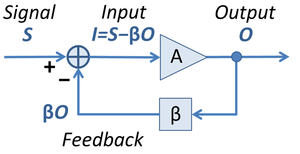
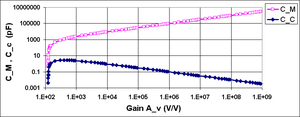

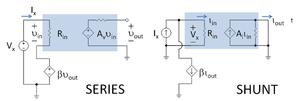









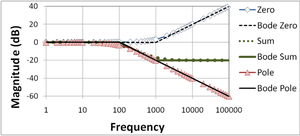









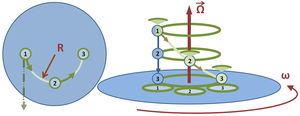







![Some details of the Earth-Moon system. Besides the radius of each object, the radius to the Earth-Moon barycenter is shown. Photos from [NASA]. Data from [NASA]. Planets aren't spheres and orbits aren't circles, so numbers are only indicative. The Moon's orbital plane precesses about the Earth in an 18.6 year cycle. Its axis is located by Cassini's third law.](http://upload.wikimedia.org/wikipedia/commons/thumb/4/43/Earth-Moon.PNG/300px-Earth-Moon.PNG)








